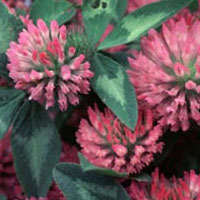Gluten Free
What does following a gluten-free diet mean? That you're embarking on an easy diet with a wide range of health-promoting effects. Instead of dwelling on what you’re giving up, consider that you’re going to enjoy a whole new world of delicious food options to meet your special dietary needs. You’ll be eating seasonally, choosing more fresh fruits and vegetables, focusing on meats, seafood, poultry, legumes, lentils, corn, and rice, and discovering fascinating ancient grains such as quinoa, amaranth, and millet. You’ll be able to eat potatoes, eggs, most cheeses, even chocolate (!)—and enjoy them without guilt because you’ll be taking good care of your body. In fact, you’ll probably end up eating—and feeling—better than ever!
Visit this page for more information about living Gluten Free
---
We carry a large variety of gluten free items, the brands listed below represent just some of the offerings we carry















More Diets
Red Clover
 © Steven Foster
© Steven FosterHow It Works
Red clover is known as an alterative agent—in other words, one that produces gradual beneficial changes in the body, usually by improving nutrition; also known as a “blood cleanser.” It is a traditional remedy for psoriasis and eczema. However, the mechanism of action and constituents responsible for red clover’s purported benefit in skin conditions are unknown.
Modern research has revealed that red clover also contains high amounts of isoflavones, such as biochanin A, formononetin, and genistein, which have weak estrogen-like properties.2 Modern research has focused on a red clover extract high in isoflavones as a possible treatment for symptoms associated with menopause and cardiovascular health in menopausal women. In a double-blind study, administration of 80 mg of isoflavones per day from red clover reduced the frequency of hot flashes in postmenopausal women. The benefit was noticeable after 4 weeks of treatment and became more pronounced after a total of 12 weeks.3 Another double-blind trial found that red clover improved cardiovascular function in menopausal women.4 Various laboratory studies suggest red clover isoflavones may help prevent prostate cancer.5, 6 In a case study, use of red clover by a man with prostate cancer led to noticeable anticancer effects in his prostate after the cancer was surgically removed. Although the isoflavones in red clover may help prevent certain forms of cancer (for example, breast and prostate), further studies are needed before red clover is recommended for cancer patients.
How to Use It
Traditionally, red clover is taken as a tea, by adding 1 cup (250 ml) of boiling water to 2 to 3 teaspoons (10 to 15 grams) of dried flowers and steeping, covered, for ten to fifteen minutes.7 Three cups (750 ml) can be drunk each day. Red clover can also be used in capsule or tablet form, equivalent to 2 to 4 grams of the dried flowers. Also, 1/2 to 3/4 teaspoon (2 to 4 ml) of tincture three times per day may be taken. Standardized extracts providing 40 mg isoflavones per day are available as well.8
Copyright © 2025 TraceGains, Inc. All rights reserved.
Learn more about TraceGains, the company.
The information presented by TraceGains is for informational purposes only. It is based on scientific studies (human, animal, or in vitro), clinical experience, or traditional usage as cited in each article. The results reported may not necessarily occur in all individuals. Self-treatment is not recommended for life-threatening conditions that require medical treatment under a doctor's care. For many of the conditions discussed, treatment with prescription or over the counter medication is also available. Consult your doctor, practitioner, and/or pharmacist for any health problem and before using any supplements or before making any changes in prescribed medications. Information expires December 2025.











